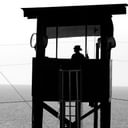
Lawyers for Abd al Rahim al-Nashiri, the man accused of plotting the bombing of the USS Cole in 2000, are seeking U.S. Supreme Court intervention to prevent his trial before a military tribunal in which Nashiri faces the death penalty if convicted. The petition for a writ of certiorari asks the Court to allow Nashiri’s lawyers to challenge his military detention — and efforts to try him in a military tribunal rather than a civilian court — because the CIA admittedly subjected him to 14 years of “physical, psychological and sexual torture.”
Hundreds of pages of documents chronicle Nashiri’s experiences. These documents include evidence that Nashiri was subjected to waterboarding, forcible sodomy, starvation, rectal force-feeding, sleep deprivation, being placed in a coffin-sized box for a total of 11 days and a box the size of an office safe for 29 hours, and being threatened with a racked gun and a revved power drill while being suspended, naked and shackled, from the ceiling of a cell in a black site one CIA agent described as “the closest thing he has seen to a dungeon.”
Dr. Sondra Crosby, an expert on the medical and psychological effects of torture, wrote in October 2015 that Nashiri, “is most likely irreversibly damaged by torture that was unusually cruel and designed to break him.” She predicted that Nashiri is likely to “decompensate fully during his trial.”
The heavily redacted descriptions of torture contained in Nashiri’s petition are based on a prosecution timeline of his time at black sites, a gradual collection of declassified information, and recently published memoirs by a former CIA contract psychologist. All of the interrogation practices are also documented in the U.S. Senate Select Committee on Intelligence’s controversial 2014 report, known as “The Torture Report.”
Nashiri’s case presents a range of important factual, legal, and evidentiary issues, but without Supreme Court intervention, he will not have any legal mechanism to obtain appellate review of them prior to trial. Although Nashiri is considered one of Guantánamo’s 15 most “high-value” prisoners, detained in a secret location in a special jail known as “Camp Seven,” his lawyers argue he is actually an intellectually limited al-Qaeda foot soldier, not a criminal mastermind. In a federal civilian court, evidence obtained as a result of the torture to which the CIA admits Nashiri was subjected would be inadmissible; but in a military tribunal, there are questions whether that evidence may be admitted and whether the fact and extent of his torture may be used as evidence in his defense. In addition, Nashiri’s case involves potentially sensitive national security matters and CIA videotapes of some of Nashiri’s interrogations may have been destroyed, leaving questions both as to what information the government may withhold and what sanctions, if any, there should be for evidence it may have destroyed.
Carol Rosenberg, In a first, former CIA captive appeals Guantánamo trial to Supreme Court, Miami Herald, March 18, 2017; Through a glass, silently: In Guantánamo, an alleged al-Qaeda killer awaits trial, The Economist, January 14, 2017.
Read Nashiri’s petition for a writ of certiorari.



